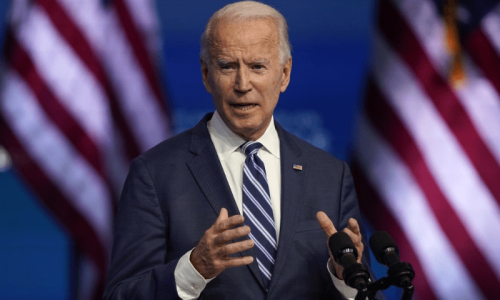WASHINGTON: A computer scientist often dubbed ‘the Godfather of Artificial Intelligence’ has quit job at Google, warning about the growing dangers from developments in the field, US media reported on Monday.
Dr Geoffrey Hinton, who created a foundation technology for AI systems, in a statement released to The New York Times pointed out that advancements made in the field posed ‘profound risks to society and humanity’.
He was quoted as saying, “Look at how it was five years ago and how it is now. Take the difference and propagate it forwards. That’s scary.”
Dr Hinton said that competition between tech giants was pushing companies to release new AI technologies at dangerous speeds, risking jobs and spreading misinformation. “It is hard to see how you can prevent the bad actors from using it for bad things,” he told the Times.
Competition between tech giants pushing companies to release new technologies at ‘scary speed’, putting jobs at risk, says Dr Hinton
In 2022, Google and OpenAI — the start-up behind the popular AI chatbot, ChatGPT — started building systems using much larger amounts of data than before. In artificial intelligence, neural networks are systems that are similar to the human brain in the way they learn and process information. They enable AIs to learn from experience, as a person would. This is called deep learning.
The British-Canadian cognitive psychologist and computer scientist told the BBC that chatbots could soon overtake the level of information that a human brain holds. “Right now, what we’re seeing is things like GPT-4 eclipses a person in the amount of general knowledge it has and it eclipses them by a long way. In terms of reasoning, it’s not as good, but it does already do simple reasoning,” he said.
“And given the rate of progress, we expect things to get better quite fast. So we need to worry about that.”
“Right now, they’re not more intelligent than us, as far as I can tell. But I think they soon may be,” he told the BBC.
He told the Times he believed that these systems were eclipsing human intelligence in some ways because of the amount of data they were analysing. “Maybe what is going on in these systems is actually a lot better than what is going on in the brain,” he told the paper.
However, the rapid expansion of chatbots such as ChatGPT could put jobs at risk. AI “takes away the drudge work” but “might take away more than that”, he told the Times.
The scientist, who notified Google of his resignation last month, also warned about the potential spread of misinformation created by AI, telling the Times that the average person will “not be able to know what is true anymore.”
Dr Hinton accepted that his age had played into his decision to leave the tech giant, telling the BBC: “I’m 75, so it’s time to retire.”
Jeff Dean, lead scientist for Google AI, thanked Dr Hinton in a statement to US media. “As one of the first companies to publish AI Principles, we remain committed to a responsible approach to AI,” the statement added. “We’re continually learning to understand emerging risks while also innovating boldly.”
In March, tech billionaire Elon Musk and a range of experts called for a pause in the development of AI systems to allow time to make sure they are safe.
An open letter, signed by more than 1,000 people including Musk and Apple co-founder Steve Wozniak, was prompted by the release of GPT-4, a much more powerful version of the technology used by ChatGPT.
Dr Hinton did not sign that letter at the time, but told The New York Times that scientists should not “scale this up more until they have understood whether they can control it.”
Published in Dawn, May 3rd, 2023















































Dear visitor, the comments section is undergoing an overhaul and will return soon.